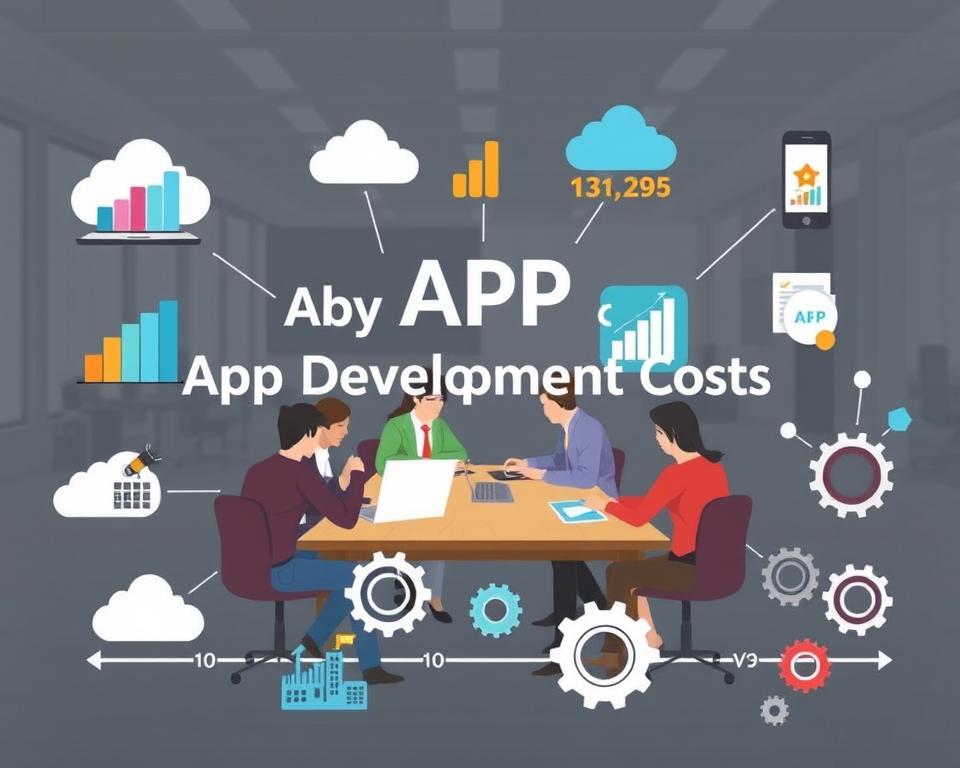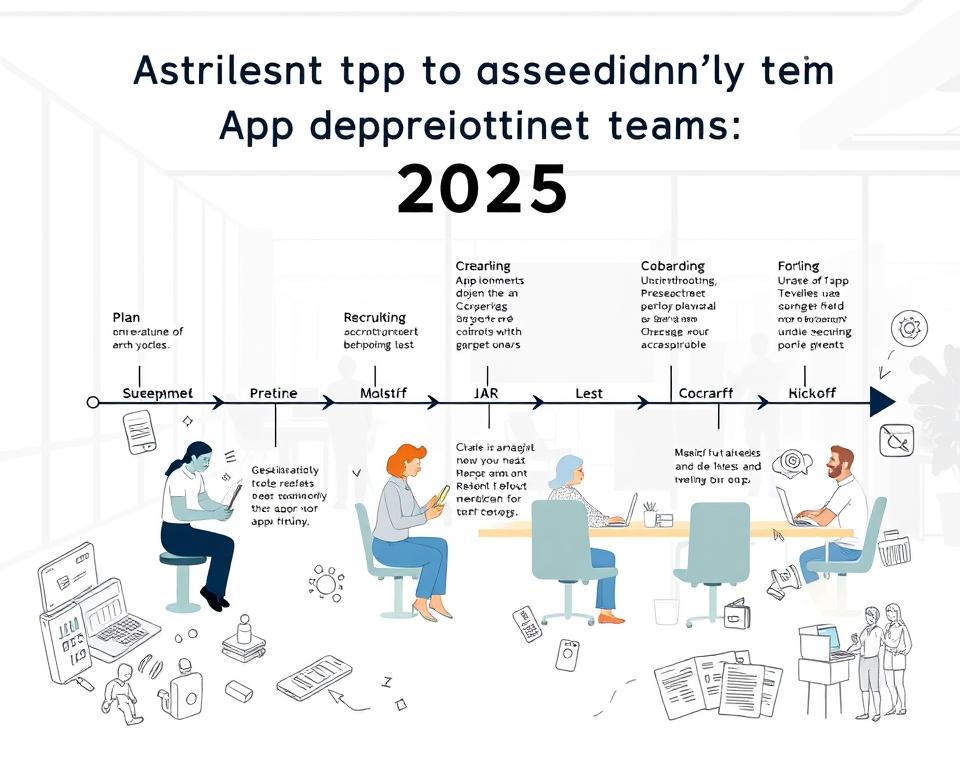The digital world is changing fast, and mobile apps are more important than ever. Companies from all fields see the big benefits of having a dedicated app team. This team can improve customer service and make operations smoother. But, the cost of setting up and keeping such a team is a big worry for any company planning to make an app in 2025 and later.
In this detailed article, we’ll look at the costs of hiring a dedicated app team. We’ll talk about what affects prices, global trends, and the financial effects of different team setups. By the end, you’ll know how much to budget and what to think about when building a top-notch app team in 2025.
Table of Contents
Key Takeaways
- The cost of hiring a dedicated app development team in 2025 will be driven by global market trends, digital transformation, and industry-specific drivers.
- Factors influencing app development team costs include location, team structure, skill sets, and project management requirements.
- Comparing in-house vs. dedicated development teams can provide valuable insights into the financial implications and long-term ROI of each model.
- Attention to geographic location, essential skills, and contract models is crucial for optimizing development costs in 2025.
- Quality assurance, project management, and legal compliance are additional cost considerations for businesses planning app development projects.
Understanding the Current App Development Market Landscape
The app development world is changing fast, thanks to digital transformation. More people want apps that are easy to use and innovative. Knowing the global trends, the role of digital change, and what drives the app market can help businesses and experts.
Global Market Trends in App Development
Several trends are changing the app development scene. New tools like low-code and no-code platforms are making app creation easier. Also, the use of AI, AR, and focus on user experience are big changes.
Impact of Digital Transformation on Development Teams
Digital transformation is changing how app teams work. They need new skills, team setups, and ways to work. Agile and DevOps methods help teams keep up with fast changes in the market and what users want.
Key Industry Drivers
- More people using mobile devices and apps for everyday tasks
- Businesses need to improve their online presence and offer smooth customer experiences
- The Internet of Things (IoT), gig economy, and data-driven decisions are becoming more important
- Mobile apps are being used in many fields, like healthcare, finance, education, and e-commerce
To keep up with the app development world, it’s key to understand these trends, the effect of digital change, and the main drivers. This knowledge helps businesses and experts stay competitive and make the most of the changing app market.
Factors Influencing App Development Team Costs
Several key factors affect the cost of hiring a dedicated app development team. These include the team’s size and expertise, the project’s complexity, and the technology needed. Knowing these factors is essential for businesses planning to develop mobile apps.
The size and skill mix of the team greatly influence costs. Larger teams with a variety of skills cost more than smaller, specialized ones. The experience and seniority of developers also matter, as more experienced developers are pricier.
- Team size and composition
- Developer expertise and seniority levels
- Project complexity and technical requirements
- Geographic location and local market rates
- Ongoing maintenance and support needs
The project’s complexity and the technologies used can also raise costs. Apps with complex features or advanced programming languages need specialized, expensive teams. The location of the development team also affects costs, as labor rates vary by region.
Finally, consider the app’s long-term maintenance and support needs. Bug fixes, updates, and migrations add to the app’s total cost over time.
| Cost Factor | Impact on Development Team Pricing |
|---|---|
| Team Size and Composition | Larger teams with diverse skill sets command higher costs |
| Developer Expertise and Seniority | Senior-level talent comes with a premium price tag |
| Project Complexity and Technical Requirements | Sophisticated features and advanced technologies increase costs |
| Geographic Location | Labor costs and market rates vary by region |
| Ongoing Maintenance and Support | Long-term ownership costs must be accounted for |
Understanding these cost factors helps businesses plan their app development budget better. This ensures they get the most value from their investment.
Cost of Hiring a Dedicated App Development Team in 2025
The app development world is changing fast. Knowing the costs for a dedicated team in 2025 is key. This includes hourly rates, monthly costs, and hidden expenses. We’ll explore the full financial picture of creating a skilled app development team.
Average Hourly Rates by Region
App development rates vary by location. Here’s what’s expected in 2025:
- United States: $75-$150 per hour
- Western Europe: $60-$120 per hour
- Eastern Europe: $40-$90 per hour
- Asia: $30-$80 per hour
Monthly Team Cost Breakdown
Monthly costs for a dedicated team go beyond hourly rates. Team size, seniority, and project complexity affect costs. Here’s a rough idea of what to expect in 2025:
| Cost Category | Approximate Monthly Cost |
|---|---|
| Salaries and Benefits | $50,000 – $150,000 |
| Project Management | $5,000 – $20,000 |
| Tools and Infrastructure | $2,000 – $10,000 |
| Quality Assurance | $3,000 – $15,000 |
Hidden Cost Considerations
There are hidden costs when hiring a dedicated team. These include:
- Recruitment and Onboarding Costs: Finding, vetting, and integrating new team members.
- Training and Ongoing Education: Keeping the team’s skills sharp.
- Legal and Compliance Requirements: Contracts, IP protection, and regulations.
- Risk Mitigation Strategies: Insurance, security, and disaster recovery.
Understanding these costs helps plan for a dedicated app development team in 2025.
Team Structure and Required Roles
Building a successful app development team needs careful planning. It’s important to have the right skills and expertise. The team’s makeup can change based on the project’s size. But, most teams have key roles that work together well.
The project manager is at the heart of the team. They manage the whole process, coordinate the team, and make sure things are done on time. A business analyst is also key. They understand what the client needs and turn those needs into technical plans.
- The user experience (UX) designer focuses on making the app easy and fun to use. The user interface (UI) designer makes the app look good.
- Software architects and developers are the team’s core. They make the app work as planned and meet its goals.
- Quality assurance (QA) engineers are vital. They test the app, find problems, and fix them before it’s released.
For more complex projects, the team might include mobile app developers, backend engineers, DevOps engineers, and data analysts. The team’s structure and roles can change. But, a well-organized and working together team is essential for a successful app.
“Effective team composition is crucial for app development success, as it ensures the right mix of skills and expertise to bring the project to life.”
Comparing In-House vs. Dedicated Development Teams
Organizations face a big decision in app development: build an in-house team or outsource to a dedicated team. This choice affects finances and long-term returns. Let’s look at the main differences between these options.
Financial Implications of Both Models
Building an in-house team costs a lot upfront for salaries, benefits, and setup. On the other hand, outsourcing to a dedicated team can be cheaper and more flexible. This lets companies adjust their spending as needed.
Long-term ROI Considerations
In-house development gives more control and customization but measuring long-term ROI is hard. Dedicated teams, however, offer quick results and proven skills. This can lead to better returns over time.
Operational Differences
- In-house teams need constant management, training, and keeping staff. Dedicated teams are often more independent.
- Dedicated teams can bring in more specialized talent, while in-house teams are limited to local talent.
- Dedicated teams have better project management and communication, making work more efficient and saving costs.
Choosing between in-house development and a dedicated team needs careful thought. You must consider your organization’s needs, resources, and goals. Knowing the financial, ROI, and operational differences helps make a choice that fits your app development plan.
“The key is to match the right development model to your specific business needs and priorities.”
Geographic Location Impact on Development Costs
The place where your app development team is located can greatly affect your project’s costs. You have to think about offshore, nearshore, or onshore teams. Each choice has different price points that need careful thought.
Offshore teams, in other countries, are usually the cheapest. Teams in Eastern Europe or Asia can offer skilled workers at lower rates. But, you also have to consider time zone issues, communication problems, and quality concerns.
Nearshore teams, in nearby countries, offer a good middle ground. They are more affordable than onshore teams but still have good time zone and cultural matches. This makes teamwork easier.
Onshore teams, in the same country as you, are the most expensive. But, they allow for face-to-face meetings, easier communication, and better project oversight.
“The decision to choose offshore, nearshore, or onshore development teams should be based on a thorough analysis of your project’s specific requirements, budget, and long-term goals.”
Knowing how location affects costs helps businesses make smart choices. These choices should match their goals and budget.
Essential Skills and Expertise Requirements
When you’re building a team for app development, focus on the right mix of developer skills, technical expertise, and soft skills. These are key to project success and delivering top-notch apps that meet your goals.
Technical Competencies
For a top app development team, you need skills in programming languages, frameworks, database management, API integration, and mobile platforms. A good team should know a lot about:
- Programming languages like Java, Swift, Python, and JavaScript
- Frameworks such as React, Angular, and Node.js
- Database design and management, including SQL and NoSQL
- Integrating APIs and services
- Developing for iOS and Android
Soft Skills and Communication Abilities
But it’s not just about tech skills. A great team also needs strong soft skills and communication. These include:
- Working well together and as a team
- Talking clearly and writing well
- Being good at solving problems and thinking critically
- Adjusting to project changes
- Pay attention to details and focus on quality
Industry-specific Knowledge
It’s also good to have team members who know your industry well. This means understanding rules, what users like, and best practices. This mix of tech skills and industry knowledge helps make apps that are both useful and follow the rules.
| Skill Type | Key Competencies |
|---|---|
| Technical Expertise |
|
| Soft Skills |
|
| Industry Knowledge |
|
“The most important thing for a great app development team is to have a diverse set of skills, from technical expertise to strong communication abilities and industry-specific knowledge.”
Contract Models and Pricing Structures
In the world of app development, picking the right contract model and pricing is key. Businesses have many choices, each with its own benefits and challenges. The right model can greatly affect costs and project success.
Fixed-Price Contracts
Fixed-price contracts give a clear budget, helping businesses plan better. They’re good for projects with a clear scope. But, they need careful planning to avoid extra costs.
Time-and-Materials Engagements
Time-and-materials (T&M) contracts are flexible, with costs based on actual time and resources. They’re great for projects with changing needs. But, they need close monitoring to stay within budget.
Hybrid Approaches
Hybrid models mix fixed-price and T&M elements. They offer predictability and flexibility. But, they need careful planning to work well for everyone.
The right contract model depends on the project’s needs and budget. Understanding these options helps businesses make smart choices that fit their goals and budget.
Timeline Considerations for Team Assembly
Building a dedicated app development team is key to a project’s success. Knowing the timeline helps businesses plan and budget well. We’ll look at the main steps: recruitment, team integration, and project start-up.
Recruitment Process Duration
Finding the right team members can take time, especially for specialized roles. The search time depends on the project’s needs, the team’s availability, and the hiring process. Generally, finding a dedicated app development team can take 4-8 weeks.
Team Integration Periods
- After the team is hired, they need time to work well together.
- This integration phase lasts 2-4 weeks. It helps team members get to know each other and their roles.
- They also learn about the project, tools, and processes during this time.
Project Ramp-up Time
Once the team is ready, the project starts its ramp-up phase. This is when the team sets up, learns about the project, and begins work. The ramp-up time varies based on the project’s complexity but usually takes 2-6 weeks.
| Phase | Duration |
|---|---|
| Recruitment Process | 4-8 weeks |
| Team Integration | 2-4 weeks |
| Project Ramp-up | 2-6 weeks |
Understanding the timeline for team assembly helps businesses plan and budget for app development projects. This ensures a smooth and efficient start.
Quality Assurance and Testing Costs
In app development, quality assurance (QA) and testing are key. They ensure an app’s success and longevity. But, these costs can greatly affect the project budget. It’s vital for developers and businesses to grasp these expenses.
Quality control is essential in app development. It includes various activities to check the app’s functionality, usability, and performance. These activities include unit testing, integration testing, and user acceptance testing. The costs vary based on the app’s complexity, testing tools, and the QA team’s size.
| QA Activity | Approximate Cost Range |
|---|---|
| Unit Testing | $5,000 – $15,000 |
| Integration Testing | $10,000 – $30,000 |
| User Acceptance Testing | $8,000 – $20,000 |
| Performance Testing | $12,000 – $35,000 |
There are also hidden costs in QA. These include maintaining testing infrastructure, training QA staff, and fixing defects. These can greatly affect the testing budget. It’s crucial for teams to plan and budget for these expenses.
Understanding QA and testing costs helps businesses make better app development decisions. They can ensure quality without overspending.
Project Management and Communication Overhead
Effective project management and communication are key to any app’s success. However, they also add to the project management costs. This includes spending on communication tools and time for team coordination. These overhead expenses can quickly add up.
Tools and Infrastructure Costs
Creating a successful app needs a strong set of project management and communication tools. This includes project management software, video conferencing, and collaboration tools. The costs of these tools and the infrastructure to support them can be a big part of the project management costs.
Management Time Investment
Time spent by project managers and team leaders also adds to the overhead expenses. Meetings, updates, and solving problems are vital for keeping the project on track. But, they take up a lot of the team’s time. It’s important to manage time well and allocate resources effectively to reduce these project management costs.
“Effective communication is the lifeblood of any successful app development project. Investing in the right tools and processes can help teams maximize their productivity and minimize the overhead expenses associated with project management and coordination.”
Legal and Compliance Considerations
When putting together an app development team in 2025, remember the legal and compliance costs. The app development legalities, compliance costs, and regulatory requirements can greatly affect your budget and timeline.
Protecting intellectual property (IP) is a big deal. Making sure all code, designs, and assets are licensed and secure can cost money. Also, data privacy laws like GDPR or CCPA might require you to handle data carefully and hire legal experts.
Apps in certain industries have to follow specific rules. For example, health apps must follow HIPAA, and financial apps need to meet FINRA or SEC rules.
| Compliance Requirement | Potential Costs |
|---|---|
| Intellectual Property Protection | Legal fees, licensing costs, ongoing maintenance |
| Data Privacy Regulations (GDPR, CCPA) | Data handling procedures, legal expertise, security measures |
| Industry-specific Compliance (HIPAA, FINRA, SEC) | Specialized expertise, audits, certification processes |
By tackling these legal and compliance considerations early, app development teams can set themselves up for success. This helps avoid delays, fines, and damage to their reputation.
Risk Mitigation Strategies and Associated Costs
In the world of app development, managing risks is key to success and keeping costs down. Companies need to think about different ways to manage risks and their costs. This ensures their app development money is safe.
Insurance Requirements
Development insurance is a must for app development teams. It guards against financial losses from delays, technical issues, or legal disputes over intellectual property. The right insurance can help tackle risk management challenges.
Security Measures
With growing cybersecurity costs, app developers must focus on strong security. They need to protect clients’ data and their own ideas. This includes using top-notch encryption, doing security checks often, and using the latest cybersecurity tools.
Backup and Recovery Planning
- Comprehensive backup systems to ensure data integrity and prevent loss
- Disaster recovery plans to minimize downtime and restore operations quickly
- Regular testing and updating of backup and recovery procedures
By investing in these strategies, app development teams can make their projects stronger. They can protect their clients and ensure their app development plans succeed in the long run.
Performance Metrics and ROI Measurement
Evaluating an app development project’s success is key for businesses aiming to get the most from their investment. By focusing on important performance indicators and using effective ROI measurement strategies, companies can understand the impact of their app development team.
One major app development ROI metric is user engagement. Tracking user acquisition, retention, and activity levels shows how well the app connects with users. Also, looking at revenue metrics like in-app purchases, subscriptions, and ad revenue gives a clear financial view of the app’s impact.
| Performance Indicator | Measurement Metric |
|---|---|
| User Engagement |
|
| Revenue Generation |
|
| Business Impact |
|
Businesses should also look at the app’s broader business impact. This includes cost savings, operational improvements, customer satisfaction, and staying competitive.
“By aligning performance metrics with key business objectives, organizations can effectively measure the ROI of their app development investments and make informed decisions about future strategy.”
Accurately measuring and analyzing app development ROI is vital. It helps businesses justify their investments, improve their development efforts, and achieve long-term success in the app development world.
Conclusion
In today’s fast-changing app development world, the cost of hiring a dedicated team in 2025 is key for businesses. Our study has shown what affects these costs, like hourly rates and hidden fees. The place you are in also plays a big role.
As the app development market grows, businesses need to weigh the costs of in-house teams versus dedicated ones. They must think about both the money now and the benefits later. Keeping up with trends and skills will help them make smart choices in hiring app teams.
Looking to 2025, hiring app development teams will still be a big investment. But, it can bring big rewards for those who plan well. By knowing what affects these costs, businesses can make better choices. This way, they can succeed in the fast-paced world of apps and websites.



















